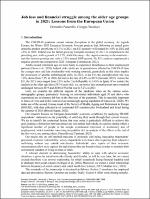Chapter Job loss and financial struggle among the older age groups in 2021: Lessons from the European Union
| dc.contributor.author | Panarello, Demetrio | |
| dc.contributor.author | Tassinari, Giorgio | |
| dc.date.accessioned | 2023-08-03T15:06:05Z | |
| dc.date.available | 2023-08-03T15:06:05Z | |
| dc.date.issued | 2023 | |
| dc.identifier | ONIX_20230803_9791221501063_94 | |
| dc.identifier.issn | 2704-5846 | |
| dc.identifier.uri | https://library.oapen.org/handle/20.500.12657/74898 | |
| dc.description.abstract | The COVID-19 pandemic has caused detrimental economic effects worldwide. Adults around retirement age are especially vulnerable in this respect, being more likely to experience disturbances to their employment patterns: indeed, older adults are in general more affected by COVID-19 than the younger ones and less comfortable with working remotely, particularly as this often implies the possession of specific technological skills. Here, we examine the different impacts of the pandemic crisis on the various socio-demographic groups, particularly focusing on workers aged 50 and above who have experienced an involuntary job loss in the first year of the pandemic. We make use of the second Corona round of the Survey of Health, Ageing and Retirement in Europe (SHARE), with data collected in all continental EU countries plus Switzerland and Israel during the summer of 2021. We analyse the extent to which the older European population kept being able to make ends meet, especially as a significant number of people in the sample experienced retirement or involuntary loss of employment, which translates into rising inequalities. Our results rely on subjective measures of economic well-being, measuring the respondents' self-perceived economic vulnerability. We show the ability to cover households' expenses to be associated with increasing age; however, also the likelihood of job loss results to be higher among the older individuals. Indeed, economic vulnerability is generally stronger among the individuals with poorer health and, thus, the oldest ones. We reveal the existence of a social component of poverty and highlight the need for economic support for ageing individuals in Europe, with some interesting differences across the EU countries. | |
| dc.language | English | |
| dc.relation.ispartofseries | Proceedings e report | |
| dc.subject.classification | thema EDItEUR::J Society and Social Sciences | en_US |
| dc.subject.other | SHARE Corona Survey | |
| dc.subject.other | COVID-19 pandemic | |
| dc.subject.other | Economic well-being | |
| dc.subject.other | Older adults | |
| dc.title | Chapter Job loss and financial struggle among the older age groups in 2021: Lessons from the European Union | |
| dc.type | chapter | |
| oapen.identifier.doi | 10.36253/979-12-215-0106-3.26 | |
| oapen.relation.isPublishedBy | 9223d3ac-6fd2-44c9-bb99-5b98ca9d2fad | |
| oapen.relation.isPartOfBook | 863aa499-dbee-4191-9a14-3b5d5ef9e635 | |
| oapen.relation.isbn | 9791221501063 | |
| oapen.series.number | 134 | |
| oapen.pages | 5 | |
| oapen.place.publication | Florence |

